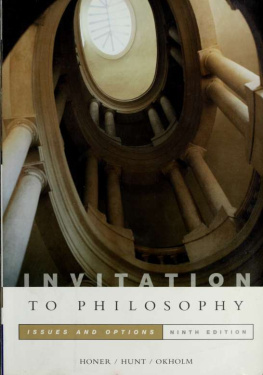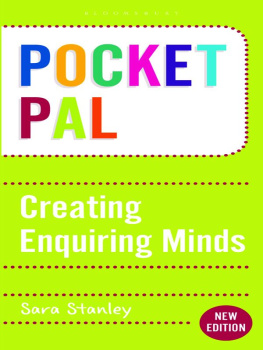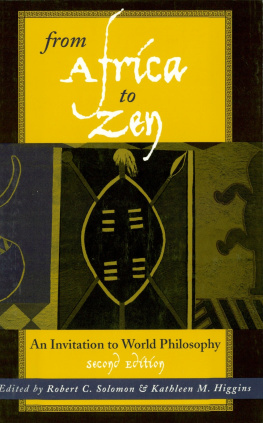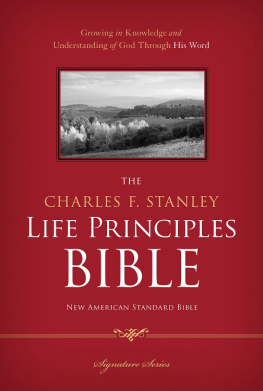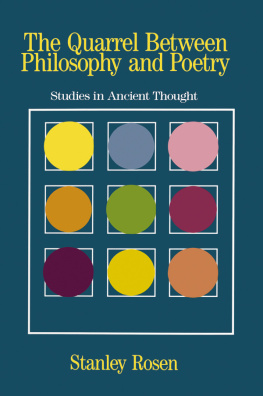Stanley M. Honer - Invitation to Philosophy
Here you can read online Stanley M. Honer - Invitation to Philosophy full text of the book (entire story) in english for free. Download pdf and epub, get meaning, cover and reviews about this ebook. year: 2001, publisher: Wadsworth Publishing, genre: Religion. Description of the work, (preface) as well as reviews are available. Best literature library LitArk.com created for fans of good reading and offers a wide selection of genres:
Romance novel
Science fiction
Adventure
Detective
Science
History
Home and family
Prose
Art
Politics
Computer
Non-fiction
Religion
Business
Children
Humor
Choose a favorite category and find really read worthwhile books. Enjoy immersion in the world of imagination, feel the emotions of the characters or learn something new for yourself, make an fascinating discovery.
- Book:Invitation to Philosophy
- Author:
- Publisher:Wadsworth Publishing
- Genre:
- Year:2001
- Rating:5 / 5
- Favourites:Add to favourites
- Your mark:
- 100
- 1
- 2
- 3
- 4
- 5
Invitation to Philosophy: summary, description and annotation
We offer to read an annotation, description, summary or preface (depends on what the author of the book "Invitation to Philosophy" wrote himself). If you haven't found the necessary information about the book — write in the comments, we will try to find it.
Invitation to Philosophy — read online for free the complete book (whole text) full work
Below is the text of the book, divided by pages. System saving the place of the last page read, allows you to conveniently read the book "Invitation to Philosophy" online for free, without having to search again every time where you left off. Put a bookmark, and you can go to the page where you finished reading at any time.
Font size:
Interval:
Bookmark:

This book made available by the Internet Archive.







Digitized by the Internet Archive in 2012
http://archive.org/details/invitationtophilOOstan
x Preface
As was true in the previous editions, attention has been paid to recent developments in philosophy, particularly in feminist and postmodern thought. In this ninth edition, we have given greater attention to the impact of feminist thought in the areas of perception (Chapter 3) and metaphysics (Chapter 5), noting intersections with postmodern philosophy, and we have expanded the brief mention of feminist moral theories to a section of its own in the chapter on ethics (Chapter 8). Some discussions have been diminished in size and significance from previous editions, most notably the discussions of existentialism (in Chapter 5 especially) and situationalism (in Chapter 8). We have also added more cross references between chapters so that students can more readily connect concepts from various areas of philosophy. Bibliographies at the end of each chapter have been weeded and updated. Minor corrections, additions, and expanded explanations have been added throughout. Finally, beyond the case studies and discussion questions, there have been some additional suggestions at the end of each chapter: occasional group activities and in-class and out-of-class exercises, video and movie suggestions, and key terms that can be looked up on InfoTrac College Edition. InfoTrac College Edition is an Internet service to which many college libraries subscribe or about which you can learn by contacting Wadsworth's Web site. By looking up the terms that we suggest, students can move to other related topics on InfoTrac College Edition, find articles and book citations, and locate encyclopedia entries. This is valuable for suggesting research topics or learning more about specific issues.
We have tried to keep the student current, but we have not compromised the material on classical philosophical positions and issues, and we have resisted the temptation to be faddish. Care has been taken to help students relate classical philosophical discussions to contemporary concerns. Jumping into the latter without a good introduction to the former is like walking into a movie with an involved plot an hour after it began.
Acknowledgments for long-standing debts include many whose assistance and support have been invaluable at different stages of revisions in eight editions. For their assistance in preparing the manuscript and index and offering suggestions on structure and content special recognition is due Elizabeth Honer, Trudie Hunt, and Trevecca Okholm.
We also acknowledge the encouragement, cooperation, and suggestions of teaching colleagues at various points: Roger Johnson, James D. Thomas, Harold Loy, Jose Jacinto, Ralph Spaulding, Robert O'Connor, Bruce Benson, and Arthur Holmes. Students at Mt. San Antonio College endured classroom experimentation with the materials that eventually became part of the text, and students at Western Kentucky University and Wheaton College have made valuable observations and suggestions along they way as they have used the text; we owe them our gratitude.
We also thank the following reviewers for many helpful insights and recommendations that assisted in the revisions for this edition: Paul Blaisdell, Baltimore City Community College and Kevin Galvin, East Los Angeles College.
Preface xi
Our thanks also go to Wadsworth Publishing Company, editor Peter Adams, assistant editor Kara Kindstrom, and an excellent staff. These professionals combine years of publishing knowledge and expertise, support and encouragement, and empathetic patience.
Finally, we recognize our profound indebtedness to the many philosophers and teachers whose ideas have been incorporated in our book, and whose comments here and there have made this a better book.
Any errors and shortcoming of the ninth edition are chargeable to the authors alone.
S.M.H. T.C.H. D.L.O.
Invitation to Philosophy
Issues and Options
Ninth Edition
Prologue
Everybody's Business
Long ago the famous Greek philosopher Aristotle asserted that human beings must philosophize. He believed that for most human beings philosophy was an inescapable activity. In our time the American philosopher Mortimer Adler echoed Aristotle's judgment when he proclaimed: "Philosophy is everybody's business." These two declarations, one from the Golden Age of Greece and the other from the twentieth century, set the tone and the direction for what will be explored in this introductory book.
Each person sees the world from a particular perspective; each person exhibits a more or less organized orientation toward life. As thinking human beings, we guide our actions and mold our attitudes in the light of certain beliefs or principles. When we present arguments to support the claim that something is true or real, we philosophize. When we agonize over and defend a moral judgment, we engage in philosophical work. When we give reasons to favor one political candidate over another, we practice philosophy. The professional philosopher would say that we are operating from a relatively limited number of basic assumptionswhether or not those assumptions are clearly recognized or fully examined. The distinction between the ordinary person and the philosopher, then, is merely one of degree. Ordinary people usually express their philosophical postures in simple, ordinary language; professional philosophers typically use more abstract and technical language that must be learned. The philosophical positions of ordinary people are expressed largely by implication, by acts and attitudes; professional philosophers make their thought processes explicit through the careful structuring of arguments. Further, the philosophical expressions of ordinary people are often capricious and fragmentary; professionals take pains to organize their positions and make them consistentto be systematic.
2 Prologue
Children ask philosophical questions:
Why is it wrong to tell a lie?
Where do people go when they die?
How can you tell when something is really true?
If I live in a free country, why can't I do whatever I want to?
But at some point in our lives many of us stop asking some of these profound questions. Part of the reason may lie in the fact that we find them so overwhelming or we are too easily comforted by partial or dogmatic answers. Philosophy reawakens our interest in basic questions by restoring the childhood spirit of wonder about bigger and deeper issues. Since most of us have engaged to a greater or lesser degree in the very human act of philosophizing, the formal study of philosophy merely encourages us to do it in a more systematic way That means we are challenged to think intentionally, seriously, rigorously, and thoroughly. It is an invitation to become more completely human. Thus, philosophers' questions often turn out to be more precise and sophisticated versions of the questions many of us asked when we were very young:
Font size:
Interval:
Bookmark:
Similar books «Invitation to Philosophy»
Look at similar books to Invitation to Philosophy. We have selected literature similar in name and meaning in the hope of providing readers with more options to find new, interesting, not yet read works.
Discussion, reviews of the book Invitation to Philosophy and just readers' own opinions. Leave your comments, write what you think about the work, its meaning or the main characters. Specify what exactly you liked and what you didn't like, and why you think so.

